Australians under-30 riding the green investment wave
More young business savvy Aussies are stepping up to meet the challenges of climate change – and attracting the attention of leading investment firms.
All great entrepreneurs are problem solvers.
There’s no bigger problem than climate change but fortunately growing numbers of young business savvy Aussies are stepping up to meet the challenge.
With innovative ideas which range from growing meat in a laboratory to cutting down on fashion waste, this new breed of ‘greentrepreneur’ are rolling out global solutions to help achieve a net zero economy.
They are also attracting the attention of some of the nation’s leading investment firms as a home grown climate-technology sector begins to take shape.
Here are some of the most exciting climate-tech businesses being built by Aussies aged under 30.
GEORGE PEPPOU, 30 AND TIM NOAKESMITH, 27, VOW FOOD
The future of farming is being shaped in a state-of-the-art food laboratory in Alexandria in Sydney.
Vow Foods is a key player in the global race to bring ‘cultured meat’ to your dinner plate – meat which is grown from animal cells in a bioreactor rather than harvested by raising and killing animals.
Beef, chicken pork, fish, kangaroo, alpaca and water buffalo are all on this cutting edge menu.
The company, founded by George Peppou and Tim Noakesmith, aims to satisfy growing global demand for meat without the negative environmental impacts of intensive animal farming.
Food production generates about one-third of all global greenhouse emissions.
“There is a massive growing demand for meat around the world, Mr Peppou said.
“Cultured meat is grown in a production system feed by electricity. As long as we are using renewable electricity we can produce meat close to where people are eating it and which has a very small environmental footprint relative to animal agriculture.”
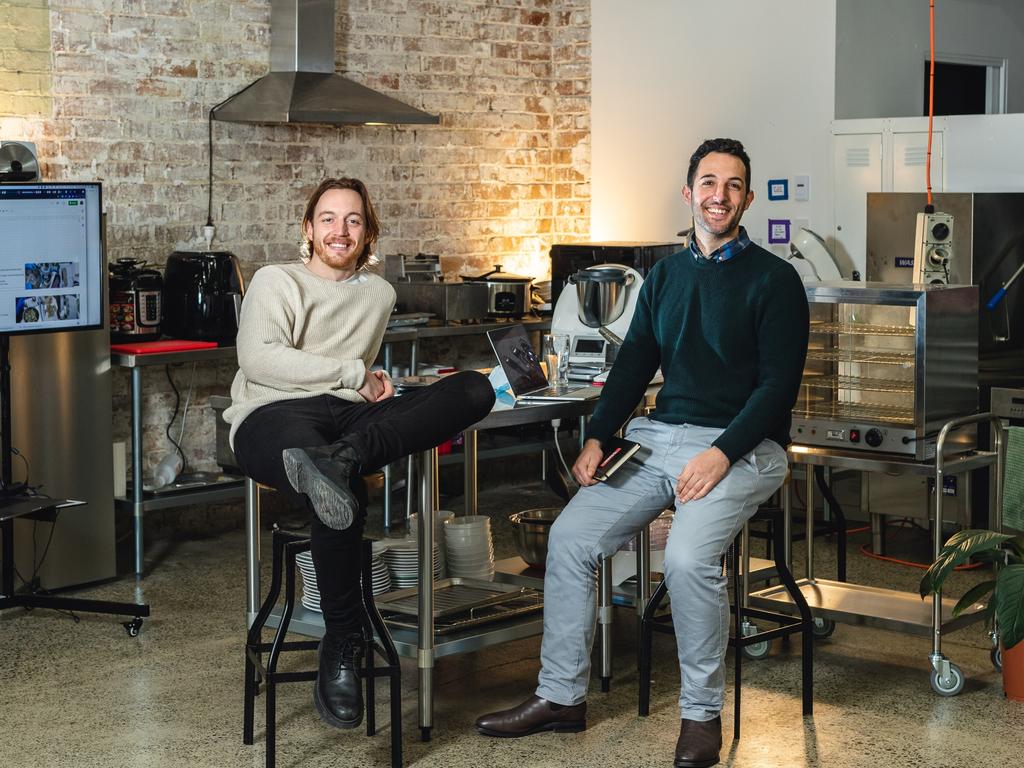
Vow has already produced cultured kangaroo meat – served up in an Asian style dumpling – and aims to launch product in Singapore next year. It has raised $8 million from investments.
Cultured meat is expensive but the Vow founders have no doubt it will end up cheaper than the naturally grown variety as the industry develops over the next 10 to 15 years.
Mr Peppou and Mr Noakesmith also want to win consumers over with tastier and healthier products.
This could include beef which has been supercharged with healthy omega 3 fatty acids contained in salmon.
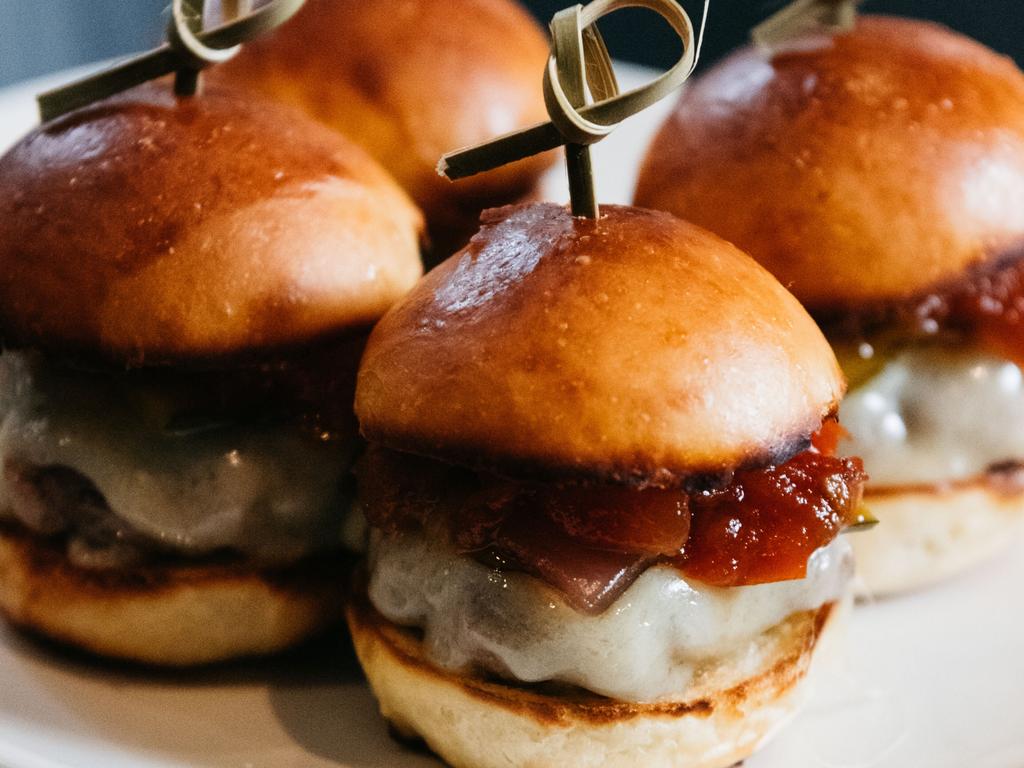
“It will taste better, it will have better texture profiles and we are able to combine nutrition profiles that don’t exist in single animals alone,” Mr Noakesmith.
As the duo work to lower the emissions profile on the agricultural sector, they say Australia needs to lift its climate change ambitions.
“We are facing one of the biggest crises to face the human race ever and there is a lack of action and urgency around the nation’s climate policy,” Mr Noakesmith said.
HANNON COMAZZETTO, 29, AIRROBE
The fashion industry has a waste problem.
The rise of fast fashion means the industry now generates 90 million tonnes of landfill waste annually and accounts for 10 per cent of global carbon emissions, more than all international flights and maritime shipping combined.
Those startling numbers prompted Hannon Comazzetto to launch AirRobe which allows consumers to re-sell, rent or recycle their fashion purchases.
“Like most people, I hate seeing fast fashion ending up in landfill but I also understand the financial realities of not being able to invest in slow and sustainable fashion all the time,” she said.
“I wanted to find a way to make it easier for buyers and sellers to make more sustainable choices and make some money at the same time.”
The 29-year-old launched the service from Melbourne in 2019 and it has quickly attracted the attention of serious investors. It has raised around $1 million.
Among them are venture capital fund Blackbird Ventures – chaired by Mike Cannon Brookes – and Investible which was any early backer of Afterpay.
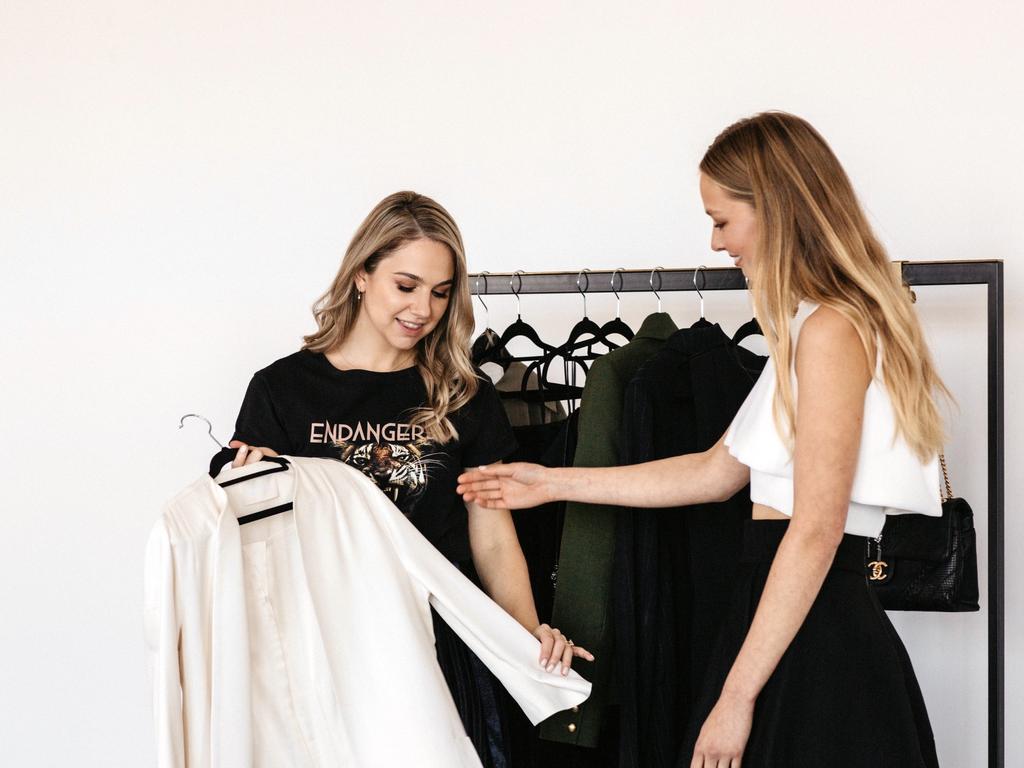
While AirRobe’s appeal to fashionistas is apparent, Ms Comazzetto is determined to involve major retailers in the project as she pushes the idea of a circular economy.
Shoppers who can see the resale value of an item are more likely to spend with that brand, she argues.
“For retailers it’s a way to meaningfully enter the circular economy that is actually financially beneficial to them,” she said.
Australians each discard about 23 kilograms of leather and textiles a year, according to the Australian Bureau of Statistics.
Ms Comazzetto points out buying a preloved item helps save 19kg of carbon dioxide emissions, 95 litres of water and 1kg of textile waste.
“The most sustainable item of clothing is the one that you keep out of landfill,” she said.
ASHLEY BAXTER, 25, MONTY COMPOST
The humble compost pile could play a meaningful role in addressing climate change.
But too many of us, says Monty Compost founder Ashley Baxter, find it too difficult or gross or are not doing it properly even when we do.
The 25-year-old aims to change via a “personal trainer” for your compost – a smart environmental sensor that tracks markers such as temperature, humidity and volatile organic compounds.
A mobile app then provides information, alerts and suggestions to ensure the compost remains in prime condition.
“Compost is an incredible solution to climate change,” Ms Baxter said.
“It recycles food waste, it produces organic fertiliser which can replace artificial fertilisers, it sequesters carbon and it reduces water demand. Three billion tonnes of organic waste is produced every years globally. If that can be efficiently recycled that is a really massive opportunity.”
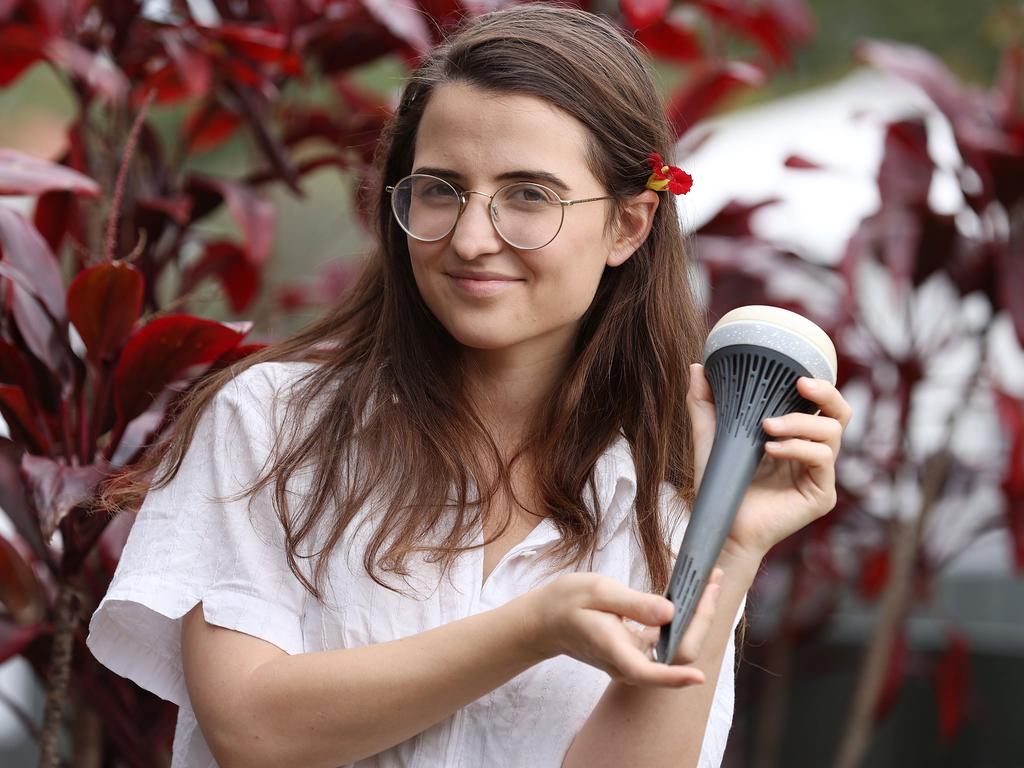
While Ms Baxter is on a mission to get the globe composting, the Brisbane native stresses it’s not just about dumping food scraps in a bin in your backyard.
“That’s just landfill,” she said.
“Composting is when you actively manage the decomposition. The reason why people get the issues with composting – the smells, the pests, the grossness – is because people are dumping waste into a landfill pile, not a compost pile.”
Ms Baxter started drawing up plans for the Monty sensor while studying business management and information technology at the University of Queensland. The company in Newstead, Brisbane, has raised about $500,000 from investors.
The company has rolled out 1000 monitors as it continues to test the device.
The ultimate aim is to sell the device at major gardening outlets such as Bunnings for less than $100.
Ms Baxter said the discussion of climate change in Australia was often narrowly focused on solar panels and electric cars to the detriment of other, powerful measures such as soil sequestration.
“We need to broaden the conversation,” he said.
MATTHEW FORREST, 26, ECONOMICAL ENERGY
It’s one of the bottlenecks to rolling out renewables – how to store power for when the wind isn’t blowing and the sun isn’t shining.
Pumped hydro is limited by geography while big batteries can be an expensive way of delivering large amounts of power over long periods of time.
Economical Energy founder Matthew Forrest believes he has come up with a storage system which can bridge the problem.
The 26-year-old has developed a gravity feed energy storage system which effectively works as a battery.
Dubbed Viper, the device stores energy by lifting heavy pellets made from mine waste from the bottom of a vertical bucket elevator to the top and releases it by running in the opposite direction.
It works on the same principals of pumped hydro but doesn’t need water, meaning it can be pretty much installed anywhere.
Mr Forrest said it was also a cheaper form of longer storage – able to release energy for more than 10 hours – than big batteries.
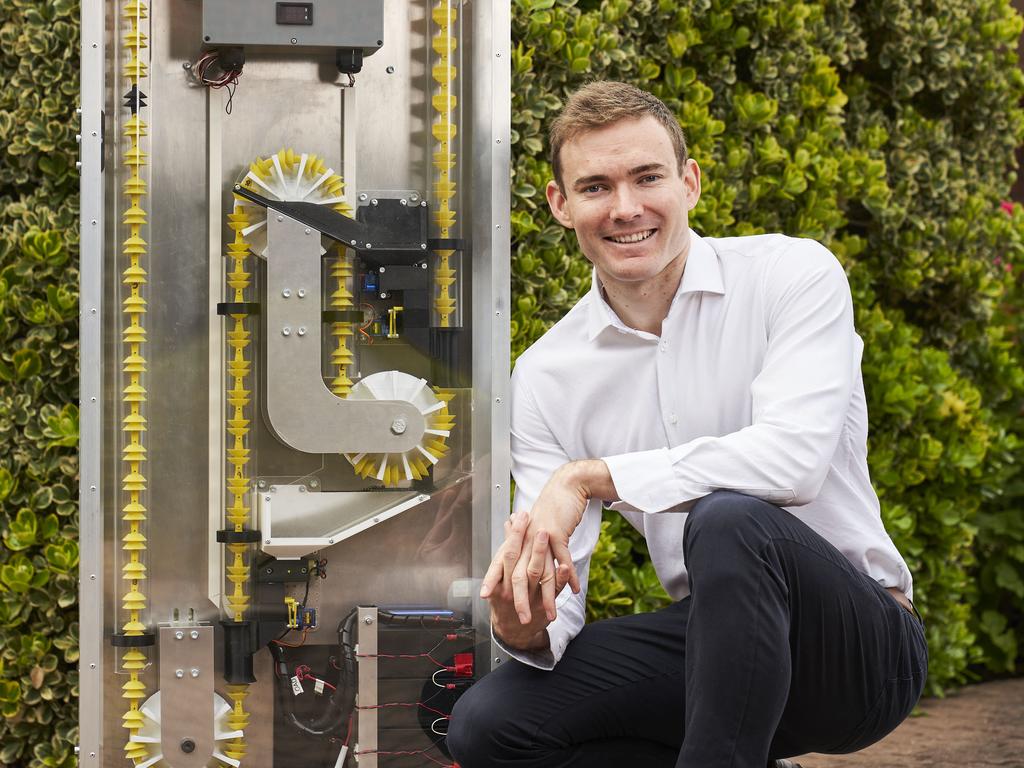
“Energy storage has long been recognised as the missing piece of the puzzle required to transition to variable renewable energy sources,” he said
“Existing techniques work, however are too expensive to deliver promptly and at the scale required.”
Mr Forrest became interested in storage systems for renewable energy while studying mechatronic engineering and computer science at the University of Adelaide.
He launched Economical Energy in 2019 in Marleston, Adelaide, and the company is in the process of designing a 1MW commercial demonstration unit.
The unit, spanning a 470m long shaft, aims to power 1300 homes for more than 10 hours.
Ultimately the company hopes to roll out a 15MW device, spanning a 1 kilometre shaft, which could power 14,000 homes for more than 12 hours.
“Australia has excellent renewable energy resources – there is a lot more we can be doing to make better use of them,” Mr Forrest said.
Originally published as Australians under-30 riding the green investment wave




